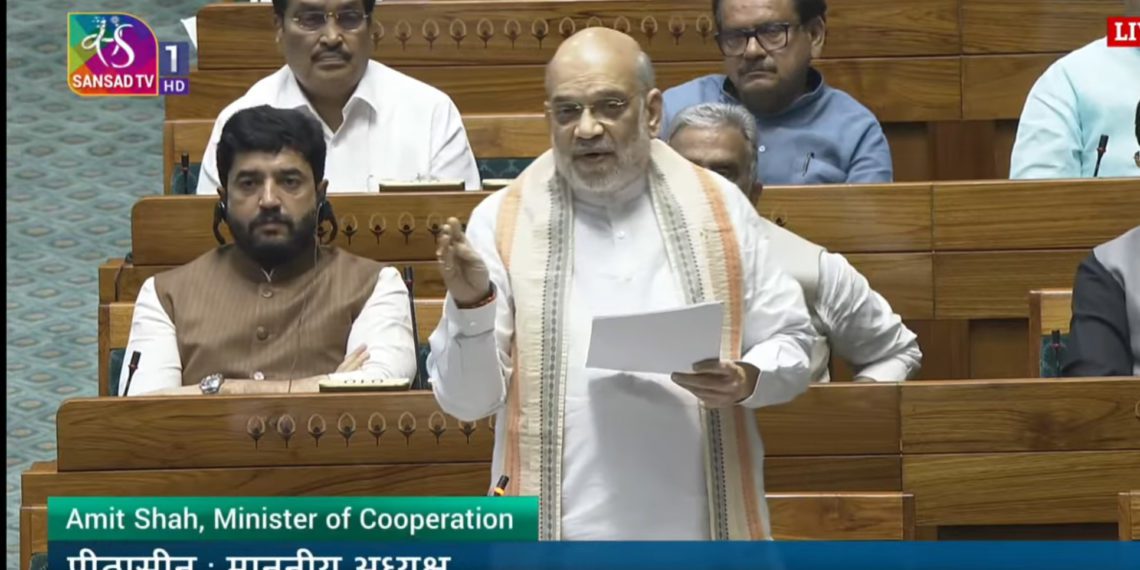The Lok Sabha today passed the Tribhuvan Sahkari University Bill, transforming the Institute of Rural Management Anand (IRMA) into India’s first cooperative university. The bill, moved by Union Home and Cooperation Minister Amit Shah, was passed by voice vote.
Announcing the bill’s passage at 6:25 PM, Lok Sabha Speaker Om Birla emphasized its significance for India’s cooperative sector. With Ministers of State for Cooperation present, Amit Shah outlined the university’s benefits, highlighting its ambitious goal to train 8 lakh cooperative professionals annually from the first year.
Recognized as an institution of national importance, the university will specialize in technical and management education for cooperatives, aligning with the government’s “Sahkar Se Samriddhi” (Prosperity through Cooperation) vision. It aims to strengthen India’s cooperative movement by integrating IRMA as one of its schools, advancing research, development, and institutional networks.
Amit Shah described the bill as a milestone in India’s cooperative history, ensuring cooperatives can compete with corporates through world-class education and skill development. He emphasized the university’s role in strengthening the rural economy, promoting self-employment, and fostering small enterprises. The university is named after Tribhuvan Bhai Patel, a pioneer of India’s cooperative movement and a key figure in Amul’s foundation.
“This university will empower cooperatives with specialized knowledge,” Shah stated. “The Modi government’s contributions to the cooperative sector will be remembered in golden letters.”
With a focus on cooperative management, governance, and innovation, the university aims to enhance competitiveness in the sector. It will follow inclusive admission and employment policies, ensuring equal opportunities for all, in line with Central Government reservation policies.
To maintain accountability and high educational standards, the Central Government will oversee operations, appoint a Chancellor, and regulate governance.
The university builds on IRMA’s legacy, established in 1979 under Dr. Verghese Kurien, supported by NDDB, SDC, and the governments of India and Gujarat. This transformation aspires to set global benchmarks in cooperative education, driving economic growth and self-sufficiency in rural India.
The bill’s passage has sparked widespread optimism, marking a historic step for India’s cooperative sector and education system.
While tabling the bill for the creation of Tribhuvan Sahakari University, Union Minister Amit Shah said that in view of the development and expansion of the cooperative sector, trained human resources are needed, and Tribhuvan Sahkari University will work to fulfill this need. The work of registering an institute of cooperative studies in any part of the country will be done after checking its status.
After the formation of a cooperative university, its diploma and degree holders will get jobs. Through this university, we will make a big contribution to the domestic as well as global value chain. A new-age cooperative culture will also start from this university.
He said that there are thousands of cooperative education training institutes spread across the country, but none of them has a common course. We have designed the course keeping in mind the needs of the cooperative sector even before the university was formed. The university will offer degree and diploma courses, and PhD degrees will also be awarded. Additionally, there will be a one-week certificate course for existing employees.
The Union Minister of Cooperation said that through this bill, cooperative principles and activities will be expanded. The cooperative sector will benefit from new technology. Research and innovation will also increase, strengthening the cooperative sector on the ground.
This will also bolster the rural economy. Amit Shah said that being associated with the name of a great man like Tribhuvan Das, this cooperative university will prove to be a high-quality institution. It will work to produce excellent cooperative workers in the country.
The Union Minister of Cooperation said that the university will be registered under the Societies Registration Act, 1860. The country’s first university dedicated to the cooperative sector will be established 75 years after independence and will have the capacity to educate about 8 lakh candidates every year.
Colleges affiliated with the university will be opened in almost every district within a year.
When 8 lakh people graduate with diplomas, degrees, or certificates annually, it will infuse new energy into the cooperative movement. Union Home Minister and Minister of Cooperation Amit Shah said that he has been associated with cooperatives since the age of 18 and has experienced both its strengths and weaknesses.
He said that Prime Minister Narendra Modi is laying the foundation for a prosperous India, and this bill will provide a strong structure for it. Shah emphasized that Tribhuvan Das Patel’s vision was that profits in the cooperative sector should reach every poor woman, which is why this bill is named after him.
Union Minister of Cooperation Amit Shah highlighted the transformative impact of the Modi government over the past decade, emphasizing poverty alleviation, housing, sanitation, healthcare, and rural electrification. He stressed that cooperation is key to enabling those without capital to engage in entrepreneurship.
He noted that 8 lakh cooperative societies with 30 crore members exist across India but lacked structured support until the formation of the Ministry of Cooperation. Since its inception, major reforms have been introduced, including PACS expansion, model by-laws, and cooperative computerization. Over 67,000 PACS have been digitized, with 43,000 operating as service centers.
Key financial reforms include tax reductions for cooperative societies, increased deposit limits, and expanded loan opportunities. Urban Cooperative Banks now have greater operational flexibility. National-level cooperative entities now promote exports, organic branding, and seed preservation.
Shah also highlighted India’s dairy sector growth under “White Revolution 2.0,” aiming to increase daily milk procurement to 1000 lakh liters by 2028-29. The government has ensured 100% MSP procurement for pulses and maize. A cooperative ranking framework has been established to enhance performance evaluation. He reaffirmed that cooperation will drive economic growth, self-reliance, and dignity for millions.






















































It can be termed as a farsighted grand step especially for development of rural India where individuals byjoining hands can give an unprecedented growth to our economy reason being if rural India can be brought in a woved format as ONE organised entity with equality it can definitely do wonders within no time.
It’s a bold & big step towards strengthening indian economy.My whole hearted congratulations to our Rev PM Sri Narendra Modi ji & the modern Chanakya Sri Amit Shah ji .